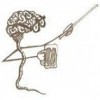Emotion and Cognition
- pburgerposted 15 years ago
0
Is emotion distinct and separate from cognition? Does emotion cloud cognition? Or does emotion inform cognition? And vice versa - does cognition inform our emotions?
In short, what is the relation between emotion and cognition?It is a bit of a false dichotomy. A lot of what we know, and learn, is emotional. and feelings (frustration, satisfcation etc) are important for driving other types of learning processes.
No simple answer but I would say that as emotion is more deep seated and primal then it must have a very significant effect on cognition.
Just one example, if you're extremely anxious(e.g. at an exam, a job interview) it can be almost impossible to calm yourself down simply by thought. That usually takes a medittative process.
Both work in concert. They are inseparably connected to who you are - the soul. The key to mastering the self is keeping all facets in check and balance. Keeping emotion to a mutually satisfying level with cognition is vital to growth mentally, physically, emotionally and intellectually. This is one of the reasons why unions between men and women are so important. Each gender tends to operate according to different sets of priority and criteria. No one set is all correct or all wrong. However, by bringing both together and intertwining them into a functioning life allowing growth that is where happiness can be found.
Hello goldenpath
Thank you for your thoughts. Personally, I agree with you, and wonder why people think otherwise.
For example, Immanuel Kant, whose Critique of pure reason still informs much of our legal & bureaucratic systems, argues for that good judgment comes when we separate emotion from cognition. That emotion clouds our judgment. And do we not hear lawyers, judges, politicians, philosophers and scientists tell us rational judgments are best made without the interference of emotions?
Are we two alone on this precarious limb of the intellectual tree?
True. I believe it an ever pursuit to make them both work in concert. Objectivity is key in judicial and executive matters but lacks without even the hint of compassion. This is where that balance comes in. If you let emotions run wild you end up with anarchy and a messed up future. If you let pure reason and intellect govern all you will find compassion a foreign word.
Simply put, whether one believes in a god or not we possess all these qualities, virtues and attributes that make up the sum total of who we are. It should be a "no brainer" that the journey of life is a journey of the mastery of all these facets. That balance is what ensures not only prosperity but also happiness.Good Day pburger
We might begin by defining our terms. What is cognition? What is emotion? I'd like to take a stab at it, if I may.
If all agree, let us call cognition (n.): the faculty of becoming aware of the world around us and interpeting it in some way; this is the general process by which we come to "know" things.
Emotion (n.): a positive or negative, non-verbal, internal reaction (as distinct from 'feelings') to an event or person.
Someone might be described as a "happy" person, and so forth. I do not regard this happiness as an emotional state. For me this refers to demeanor or feelings, which are different from emotions. Someone may be "optimistic," or "upbeat." Neither of these are emotional states; they refer to demeanor -- they are perceived and described as general states of being.
Someone might be said to be an "angry" person. Anger is an emotion, but not in the way it is used here! They way it is used in this instance is as a general state of being.
If A becomes angry at B, anger in this instance is an emotion because it is reactive. A, we can assume, becomes angry at B, for something B has done (or thought to have done) to A. A might "love" B, not for anything B may have done specifically, merely for "being who you are," and so on.
Remember, in our language, most languages, "To Be" is understood to be a verb, an action. Therefore by "being who you are," you are doing something which someone else might react to by loving you.
Therefore, what is the relationship between cognition and emotion? Emotion employs cognition to fuel it. Emotion reacts and therefore comes into being because of what the individual learns or becomes aware of. Feelings or demeanors are not necessarily triggered by specifics of any kind.Emotion is the state that arises when cognitive or biological processes are met or confounded. (Realize that cognition takes place in the brain, which is a biological thing, but I suspect this crowd currently weighing in knows why I separate them.)
Actually, recent brain imaging studies seem to indicate that for many of us, emotions drive us and the rational mind comes up with an explanation for why that must be reasonable.
Of course, most of us will have an immediate negative emotional response to the idea that we are not really rational most if the time :-)Good Day Pcunix
Yes, I can endorse that. Your point reminds me of a story I heard on NPR one time. There was a man, a conservative banker, a real logically-minded guy who fell ill or had an accident, which required him to undergo brain surgery.
It came to pass that the surgery involved the removal of a piece of the brain that had to do with the trigger of emotions (the details are sketchy for me). As a result he was rendered somewhat cold. You could show him pictures of heartrending tragedies, with people suffering in horrendous ways, and so forth. These images got no reaction from him. None! His heart rate didn't jump or anything.
There was another effect, and this goes directly to your point, Pcunix, about how we are in fact driven by our emotions that we later rationalize. This deficit also rendered him incapable of making decisions.
Now, this procedure had made him a kind of Vulcan Spock-like figure, guided solely by logic. But here's the thing. He eventually lost his job because he could not make even the smallest decisions. He would be seated at his desk paralyzed with indecision. Why?
Because he could not decide whether to sign a contract with the blue pen or the black pen. After all, one is just as logical as the other. Emotion is needed to break through the choices and pick something and "get on with it."
- BIKTMIAposted 15 years ago
0
Emotions I learned, that what I didn't like I found a way to find to like. What I liked I now no longer feel it was my call. Common ground I found that when you have commonality you can work as a team. Nobody can understand what you have not lived..
Related Discussions
- 16
Do politicians listen to the electorate? Do their feelings matter?
by tsmog 18 months ago
A Pew Research study shares that 8 of 10 Americans say elected officials/(Politicians) don't care what they think.True?False?Undecided?Does politicians and their respective party not caring about what one thinks cause different feelings such as anger and frustration affecting the...
- 45
Is Logic Emotionless?
by marinealways24 16 years ago
I argued with some "intellectuals" on a previous thread when I made the claim that emotions are separated in logic. The "intellectuals" argued that I was trying to redefine the word because it says nothing of logic being emotionless in the dictionaries. The...
- 9
Is the term 'rational person' an oxymoron?
by Gordon G. 15 years ago
Is the term 'rational person' an oxymoron?As humans, we are so guided by emotions and desires. Rarely, do the points of emotion and logic intersect.
- 4
What emotion is your greatest asset?
by PermissionGiver 14 years ago
What emotion is your greatest asset?If you can't list just one, try two or three.
- 8
Is there a negative to "sucking it up" emotionally?
by Peeples 11 years ago
Is there a negative to "sucking it up" emotionally?Is there a downside to ignoring natural emotions? Are there health consequences?
- 23
Is love an emotion or a decision? Your thoughts, please.
by Cellebrate! 15 years ago
Is love an emotion or a decision? Your thoughts, please.













